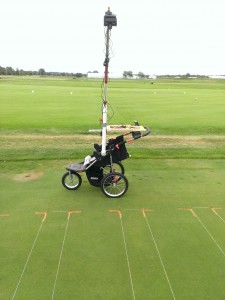
Michigan State University researchers test the ability to determine turf health with an infrared camera mounted on a boom on a jogging stroller before moving forward to purchase a drone. Photo: Bob Goodwin.Michigan state and university officials and entrepreneurs are anxiously awaiting the results of a federal appeal that will affect how a commercial drone industry develops in the state and across the country.
The status of using what are also called Unmanned Aerial Vehicles — UAVs -commercially is in a holding pattern after a federal judge ruled last month that the Federal Aviation Administration had no authority to issue a $10,000 fine against a Virginia drone pilot.
That set off celebrations in the drone community that were short-lived.
The following day, the FAA announced it would appeal the decision and the ban on commercial drone flight remains in effect until the case is ruled on again.
“In a way really nothing has changed,” said Tony Sauerbrey, the drone program manager at Northwestern Michigan College in Traverse City. “The FAA is still saying that it has jurisdiction over the airspace concerning model aircraft and (drones), and that the commercial use of those vehicles is not allowed.”
Though using drones for business is still against FAA rules, there are a number of companies operating drones in the United States for a wide variety of reasons, including real estate photography, land management and livestreaming.
One reason why companies are still operating drones despite the administration’s rules is because until the federal court case against a commercial drone pilot, the FAA had never actually punished an individual for business-related drone usage.
Kevin Haley, drone pilot and owner of Hovershots Aerial Photography and Video, has been flying drones for two decades. He’s a long-time Michigan resident who lives in Florida now, but plans to fly and shoot video for multiple commercial projects in Michigan this summer.
He said he’s not too concerned about being fined by the FAA, but added the drone community is waiting on pins and needles to get the go ahead.
“It’s like (the FAA) is trying to stop technology,” he said. “But hopefully after all these hoops to jump through in court, we’ll all be able to fly without having to worry about them going after us.”
The drone community’s anticipation is warranted, according to Sauerbrey. It’s been five years since officials began writing drone usage laws, but they’re still not finalized.
“Back in ‘09 an aviation rule committee sat down and created what will become the first UAV rules,” he said. “But it’s pretty much just been sitting there since.”
Half of a decade later, the FAA is again delaying action on drone rules by appealing the federal court ruling.
Rick Carlson of Michigan’s Office of Aeronautics says he hopes to see the FAA create clearer guidelines before part-time drone pilots start filling the skies.
“There’s a need for state control of this business,” Carlson said. “It’s my thought right now that we need some type of registration. If a drone crashes into your house or your backyard, we need to have a way to trace that.”
Both Carlson and Sauerbrey said they’re unsure of how long the appeal process will take. Carlson predicted “not until 2015,” while Sauerbrey said it could take anywhere between two weeks or two years. Sauerbrey added that both he–and his students–are tired of waiting.
“We’re just frustrated,” he said. “We have a lot of students that want to get into this industry and by having things open up, that would be huge.”
“Because that’s what they’re all here for, the eventual jobs,” he said. “So if the airspace doesn’t open up it’s going to create problems for folks. It needs to happen.”
